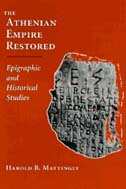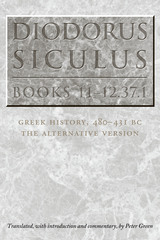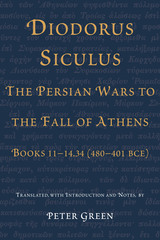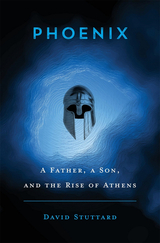
This volume collects Harold B. Mattingly's most important essays on the question, and offers them in updated form together with a new introduction and notes, and a concordance of inscriptions. A preface by Mortimer Chambers helps place the volume amid the decades- long controversy about events in and around Athens, and describes the scientific technique that has proven Mattingly's argument.
In the process of establishing a sounder methodology for investigating this crucial period of Greek--and Western--history, Mattingly in these groundbreaking essays turns a beacon of light on many aspects of Greek and Athenian society and history.


2007 — A Choice Magazine Outstanding Academic Book
Sicilian historian Diodorus Siculus (ca. 100-30 BCE) is our only surviving source for a continuous narrative of Greek history from Xerxes' invasion to the Wars of the Successors following the death of Alexander the Great. Yet this important historian has been consistently denigrated as a mere copyist who slavishly reproduced the works of earlier historians without understanding what he was writing. By contrast, in this iconoclastic work Peter Green builds a convincing case for Diodorus' merits as a historian. Through a fresh English translation of a key portion of his multi-volume history (the so-called Bibliotheke, or "Library") and a commentary and notes that refute earlier assessments of Diodorus, Green offers a fairer, better balanced estimate of this much-maligned historian.
The portion of Diodorus' history translated here covers the period 480-431 BCE, from the Persian invasion of Greece to the outbreak of the Peloponnesian War. This half-century, known as the Pentekontaetia, was the Golden Age of Periclean Athens, a time of unprecedented achievement in drama, architecture, philosophy, historiography, and the visual arts. Green's accompanying notes and commentary revisit longstanding debates about historical inconsistencies in Diodorus' work and offer thought-provoking new interpretations and conclusions. In his masterful introductory essay, Green demolishes the traditional view of Diodorus and argues for a thorough critical reappraisal of this synthesizing historian, who attempted nothing less than a "universal history" that begins with the gods of mythology and continues down to the eve of Julius Caesar's Gallic campaigns.

Only one surviving source provides a continuous narrative of Greek history from Xerxes' invasion to the Wars of the Successors following the death of Alexander the Great—the Bibliotheke, or "Library," produced by Sicilian historian Diodorus Siculus (ca. 90–30 BCE). Yet generations of scholars have disdained Diodorus as a spectacularly unintelligent copyist who only reproduced, and often mangled, the works of earlier historians. Arguing for a thorough critical reappraisal of Diodorus as a minor but far from idiotic historian himself, Peter Green published Diodorus Siculus, Books 11-12.37.1, a fresh translation, with extensive commentary, of the portion of Diodorus's history dealing with the period 480–431 BCE, the so-called "Golden Age" of Athens.
This is the only recent modern English translation of the Bibliotheke in existence. In the present volume—the first of two covering Diodorus's text up to the death of Alexander—Green expands his translation of Diodorus up to Athens' defeat after the Peloponnesian War. In contrast to the full scholarly apparatus in his earlier volume (the translation of which is incorporated) the present volume's purpose is to give students, teachers, and general readers an accessible version of Diodorus's history. Its introduction and notes are especially designed for this audience and provide an up-to-date overview of fifth-century Greece during the years that saw the unparalleled flowering of drama, architecture, philosophy, historiography, and the visual arts for which Greece still remains famous.

A Times Literary Supplement Best Book of the Year
A vivid, novelistic history of the rise of Athens from relative obscurity to the edge of its golden age, told through the lives of Miltiades and Cimon, the father and son whose defiance of Persia vaulted Athens to a leading place in the Greek world.
When we think of ancient Greece we think first of Athens: its power, prestige, and revolutionary impact on art, philosophy, and politics. But on the verge of the fifth century BCE, only fifty years before its zenith, Athens was just another Greek city-state in the shadow of Sparta. It would take a catastrophe, the Persian invasions, to push Athens to the fore. In Phoenix, David Stuttard traces Athens’s rise through the lives of two men who spearheaded resistance to Persia: Miltiades, hero of the Battle of Marathon, and his son Cimon, Athens’s dominant leader before Pericles.
Miltiades’s career was checkered. An Athenian provincial overlord forced into Persian vassalage, he joined a rebellion against the Persians then fled Great King Darius’s retaliation. Miltiades would later die in prison. But before that, he led Athens to victory over the invading Persians at Marathon. Cimon entered history when the Persians returned; he responded by encouraging a tactical evacuation of Athens as a prelude to decisive victory at sea. Over the next decades, while Greek city-states squabbled, Athens revitalized under Cimon’s inspired leadership. The city vaulted to the head of a powerful empire and the threshold of a golden age. Cimon proved not only an able strategist and administrator but also a peacemaker, whose policies stabilized Athens’s relationship with Sparta.
The period preceding Athens’s golden age is rarely described in detail. Stuttard tells the tale with narrative power and historical acumen, recreating vividly the turbulent world of the Eastern Mediterranean in one of its most decisive periods.
READERS
Browse our collection.
PUBLISHERS
See BiblioVault's publisher services.
STUDENT SERVICES
Files for college accessibility offices.
UChicago Accessibility Resources
home | accessibility | search | about | contact us
BiblioVault ® 2001 - 2024
The University of Chicago Press









